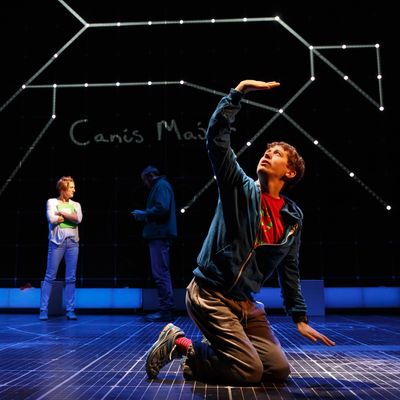
If there’s any justice, the superb stage adaptation of The Curious Incident of the Dog in the Night-Time will be as big a hit on Broadway this year as the original novel, by Mark Haddon, was when it was published in 2003. That doesn’t mean they are equivalent experiences. Although minutely faithful to the plot and language of the book, the play is, naturally, a different beast. What’s more surprising, and deeply rewarding, is that it makes a different point.
The story starts the same way: In a backyard in Swindon, England, Christopher Boone, a boy of 15 years (and three months and two days), discovers the body of a neighbor’s dog with a garden fork stuck through it. Autistic but highly gifted in math and logic, Christopher sets out like his hero Sherlock Holmes to solve the whodunit. His investigation is quickly thwarted by his father, who warns him to keep his nose out of other people’s business. But this is the kind of phrase — a metaphor — that Christopher cannot understand. His view of the world is inalterably literal. When a person says he is “going to seriously lose my shit” he is mystified, even though he has seen his father do it more than once while trying to manage his son. His mother, for reasons I cannot go into here, is also seriously lost.
In any case, Christopher continues to stick his nose in other people’s business as he circles the truth of the canicide. His investigation’s progress is mostly presented as narration by his special-needs teacher, Siobhan, reading from the book Christopher is writing about it as a homework assignment. Meanwhile the text is brilliantly illustrated with every stage trick the director Marianne Elliott and her collaborators can bring to bear. Christopher’s concept of his cosmos flashes on screens that make up the three walls and ceiling of Bunny Christie’s glamorous set; his paths through space are indicated with LEDs. Secret drawers and pop-ups abound. The ensemble of actors serves not only as other characters but also as props and disembodied voices and obstacles, turning much of the play into a kind of dance drama. There is more movement in The Curious Incident — the choreography is by Scott Graham and Steven Hoggett — than in many a musical. All the technical elements, from lighting (by Paule Constable) to sound (by Ian Dickinson) are world-class.
Yet no matter how brilliantly done, the choice to highlight the workings of Christopher’s unusual brain onstage through narration and illustration comes with trade-offs. You fret over his confusion and follow his reasoning, but after a while they threaten to smother the drama. To balance this, the adapter, Simon Stephens, takes every opportunity to insert more active, person-to-person scenes that in the book exist only as filtered through Christopher’s consciousness. As a result, the weight shifts from an interior story about a boy’s mastery to an exterior one about his suffering. It is no longer simply a Bildungsroman, in which Christopher must overcome his handicaps and undertake a heroic journey to inhabit himself fully and earn his future. It’s something more explicitly tear-jerking, and not just because the leading actors, being live people, force your perspective. (The all-American cast is excellent, and 25-year-old Alex Sharp, onstage almost the entire time as Christopher, is extraordinary.) It’s also because, lifted out of the narrowness of an autistic perspective, the play foregrounds relationships that are only distantly implied in the book. Foregrounding opens the door to doubt. Does love even exist for Christopher, who can only understand things that are material and provable? And if it does not exist for him, does it exist for anyone? The novel ends on a note of triumph; the play ends (or almost ends — there’s a surprise after the bows) on a note of ambivalence that undermines the whole premise of Christopher’s journey. That’s a good, or at any rate real, thing.
Not every change made is an enhancement. Comic and melodramatic elements, understandably, are dialed up; intellectual ones are dialed down. Act Two attempts to introduce the meta-theatrical idea of the play as an actual event in the story itself: a presentation by the special-needs school. This is a bit feeble and silly, like a party hat, but doesn’t do much damage either. A party hat can be removed. In most ways — a cause for rejoicing — the play is even more uncompromising than the book, if also a bit more familiar. Prose makes everything okay. The theater doesn’t.
*This article appears in the October 6, 2014 issue of New York Magazine.




